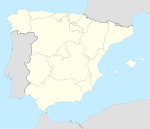Salvatierra de Tormes
| Salvatierra de Tormes municipality | ||
|---|---|---|
 Salvatierra de Tormes - castle ruins
|
||
| coat of arms | Map of Spain | |

|
|
|
| Basic data | ||
| Autonomous Community : | Castile and Leon | |
| Province : | Salamanca | |
| Comarca : | Salvatierra (Comarca) | |
| Coordinates | 40 ° 35 ′ N , 5 ° 36 ′ W | |
| Height : | 905 msnm | |
| Area : | 34.67 km² | |
| Residents : | 79 (Jan. 1, 2019) | |
| Population density : | 2.28 inhabitants / km² | |
| Postal code : | 37779 | |
| Municipality number ( INE ): | 37277 | |
| administration | ||
| Website : | Salvatierra de Tormes | |
Salvatierra de Tormes is a place and a western Spanish municipality ( municipio ) with only 79 inhabitants (as at 1st January 2019) in the province of Salamanca in the autonomous region of Castile and Leon .
Location and climate
The place Salvatierra de Tormes is located slightly above the Río Tormes or the Santa Teresa reservoir at an altitude of approx. 905 m ; the provincial capital Salamanca is just under 48 km (driving distance) north. The climate in winter is cool, but in summer it is quite warm; the rather low amounts of precipitation (approx. 455 mm / year) fall mainly in the winter half-year.
Population development
| year | 1857 | 1900 | 1950 | 2000 | 2016 |
| Residents | 374 | 696 | 821 | 62 | 75 |
The continuous decline in population ( rural exodus ) since the middle of the 20th century is mainly due to the mechanization of agriculture and the abandonment of small farms and the associated loss of jobs.
economy
The economic life of Salvatierra de Tormes is largely agrarian - in the past, grain, vines, etc. were planted for self-sufficiency ; Vegetables came from the house gardens. Cattle breeding (in the past mainly sheep and goats, today mostly cattle) was and is still practiced. The small traders, craftsmen and service providers of all kinds that were formerly resident in the town have disappeared. Today numerous holiday apartments and houses (casas rurales) are rented out.
history
No evidence from the Celtic or Roman times is known; The “Stele of Salvatierra” found around 1900 comes from the Visigothic period , but nothing is known about its whereabouts. In the 8th century the Moors overran the region; However, nothing is known of a local foundation. In the late 11th century, the area was recaptured ( reconquista ) and repopulated ( repoblación ) by the Christians . In the years around 1280 the place belonged to the manorial rule of the Infante Don Pedro (1261-1283), who died shortly afterwards. After the death of his son Sancho (1312), his property reverted to the Crown. From the 15th century, the place belonged to the Alba family .
Attractions
- The Castillo de la Mora Encantada and the adjacent city wall (muralla) date from the 13th century; however, both were subsequently changed repeatedly.
- Some houses in the town have heraldic shields made of stone.
- The Iglesia de Nuestra Señora de Monviedro was built in the 15th and 16th centuries. Century with a portal and a porch (portico) on the west side. The tower shows a mixed masonry made of broken stone and bricks . In the interior, which is covered by wooden ceilings, there are several carved altars (retablos) , including the Churrigueresque main altar.
Web links
Individual evidence
- ↑ Cifras oficiales de población resultantes de la revisión del Padrón municipal a 1 de enero . Population statistics from the Instituto Nacional de Estadística (population update).
- ↑ Salvatierra de Tormes - Climate tables
- ^ Salvatierra de Tormes - Population development

